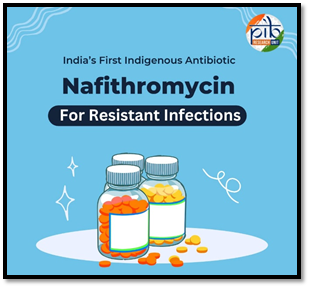India has unveiled Nafithromycin, the country’s first Macrolide antibiotic developed locally, marking a pivotal step in the global fight against antimicrobial resistance (AMR). This innovative drug, born from over three decades of research, reflects India’s expanding expertise in pharmaceutical advancements.
AMR, a global health crisis, arises when bacteria, viruses, and other pathogens adapt to resist conventional antibiotics. The issue has severe repercussions in India, claiming approximately 600,000 lives annually, with misuse and overuse of antibiotics worsening the challenge.
Nafithromycin, developed under the Biotechnology Industry Research Assistance Council (BIRAC) Biotech Industry Program, is specifically aimed at treating Community-Acquired Bacterial Pneumonia (CABP). This condition particularly affects vulnerable populations, including children, the elderly, and those with compromised immune systems. The drug received ₹8 crore in funding for Phase 3 clinical trials.
Officially launched on November 20 by Union Minister Dr. Jitendra Singh, the antibiotic is marketed under the brand name “Miqnaf.” Reports indicate it is ten times more effective than current treatments like azithromycin. Its three-day course promotes quicker recovery with minimal side effects, making it a promising solution against both typical and atypical drug-resistant bacteria.
The development of Nafithromycin required an investment of ₹500 crores and underwent rigorous clinical trials across India, the U.S., and Europe. Although it awaits final approval from the Central Drugs Standard Control Organization (CDSCO), the drug is expected to play a significant role in addressing AMR on a global scale.
India’s fight against AMR is supported by several initiatives, including the establishment of surveillance networks to monitor and report resistance data to the Global AMR Surveillance System (GLASS). Awareness programs such as the Red Line campaign also inform the public about the risks of antibiotic misuse.
The Indian Council of Medical Research (ICMR) has issued guidelines to curb unnecessary antibiotic prescriptions, while high-end antibiotics remain under strict regulation as per Schedule H1 of the Drugs Rules, 1945.
Global partnerships have bolstered these efforts, with collaborations involving organizations like the Centers for Disease Control and Prevention (CDC), the United States Agency for International Development (USAID), and the Fleming Fund. These partnerships focus on enhancing surveillance, infection prevention, and capacity building.














